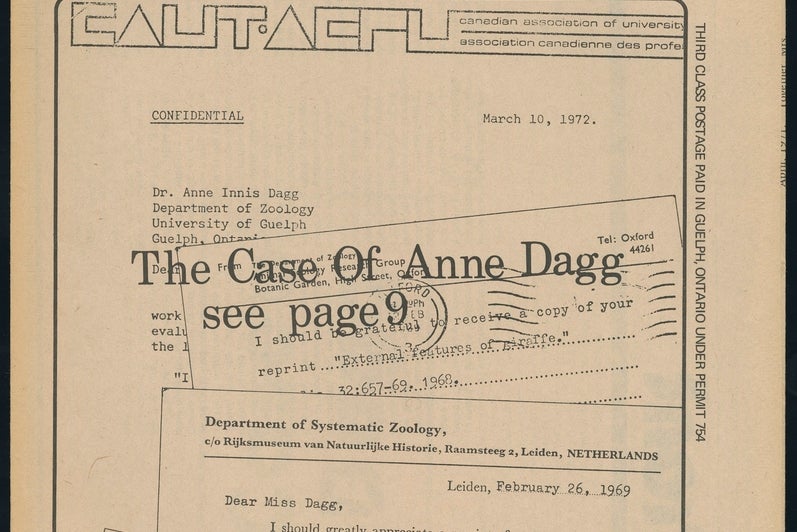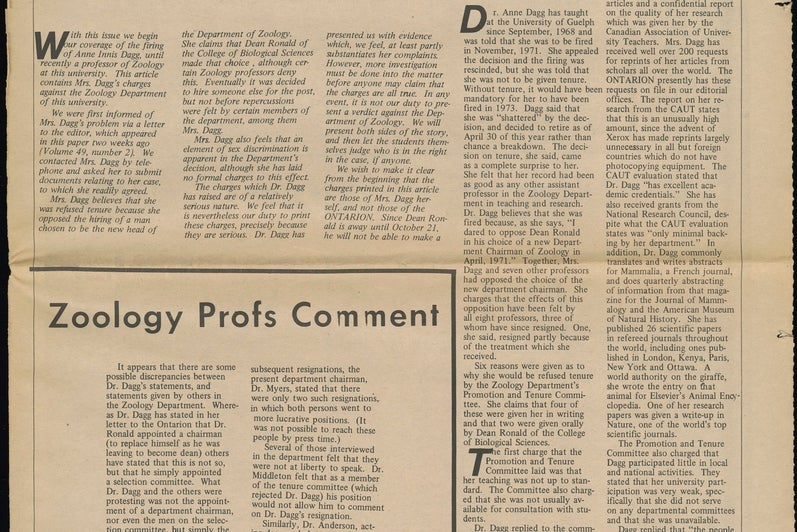Written by Jessica Blackwell, Librarian, Special Collections & Archives
Anne Innis Dagg, a groundbreaking Canadian zoologist, feminist, and environmentalist, passed away on April 1, 2024. Anne received her PhD in animal behaviour from the University of Waterloo in 1967 and was affiliate with the Independent Studies program.
Born on January 25, 1933, in Toronto, Anne showed an early passion for animals which can be seen through her newsletters that she wrote for family and friends, including the Giraffe Gazette.
Dagg's passion for zoology led her to a BA from the University of Toronto in Honours Biology in 1955 (as gold medalist), and an MA from the University of Toronto in genetics in 1956, where she was also a demonstrator for botany and genetics from 1954-1956.
In 1956, she embarked on a solo journey to South Africa, where she conducted groundbreaking research on giraffe behavior and became the first scientists to study giraffes in their natural habitat. [NB this was three years before Jane Goodall did this with chimps!]

Advocate for women in academia
Getting access to giraffes in the wild didn’t come easily, and her applications to numerous countries were denied, with the rejection letters often indicating that the work wasn’t suitable for women. She finally traveled to South Africa where she went to stay on a citrus plantation near Kruger National Park, only to be told to return to Canada when the owner discovered that “A. Dagg” was in fact female. She was eventually spent the next year observing the behaviour of 95 giraffes for up to ten hours a day.
Upon her return to Canada she embarked in a PhD in animal behaviour at the University of Waterloo, which she completed in 1967. Her thesis was later published as The Giraffe: Its Biology, Behavior and Ecology (1976) and is considered a canonical text in the field.
Throughout her illustrious career, Anne faced numerous obstacles as a woman in academia, attempting to secure faculty positions throughout the course of her PhD. She found that she was often rejected from the positions in favour of a male colleague who may have been less qualified. In one case she was told that her academic research was not fully developed, despite having published 20 peer-reviewed papers in the field and in another it was suggested that she not apply for a faculty position as she had a husband and a family to care for. This mistreatment, as well as other sexist experiences in academia including enduring sexist jokes, lack of funding for female researchers, and academic material based on gender stereotypes led to the publication of MisEducation: Women & Canadian Universities with Patricia J. Thompson.
The Case of Anne Dagg
Anne was a prolific author and wrote widely about animals, the environment, and womens’ rights. In 2018 Anne was featured in her own documentary, The Woman Who Loves Giraffes. This explored her pioneering research and her experiences in academia. It also helped to introduce Anne to a wider audience and cement her place in history. In 2019 Anne was appointed a Member of the Order of Canada.
Anne’s legacy will continue through her contributions to science, her advocacy for gender equality, and her dedication to protecting our planet. She will be deeply missed by all those whose lives she touched with her passion, wisdom, and compassion.
Anne's papers are available to view in University of Waterloo's Special Collections & Archives.





